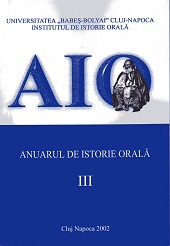Rezistenţa armată anticomunistă în zona Huedinului. Grupul "Şuşman"
Rezistance Against Communism in Huedin Region. "Şuşman" Group
Author(s): Cosmin Budeanca, Cornel JurjuSubject(s): History
Published by: Argonaut
Summary/Abstract: There was more than one partisans group involved in the Romanian anticommunist armed resistance after1944, groups that activated mostly in the country's mountain areas. Among these groups there was this one leaded by Teodor Şuşman from Răchiţele, a locality in the Apuseni Mountains. The study begins by presenting the Romanian realities during the communist regime instauration, and the new regime representatives' actions, which were the main factors that determined those who opposed communism to gather themselves into organized groups. "Şuşman" group had been set up in 1948, functioning till 1958 when its last two members died. Teodor Şuşman senior, the group's leader, had been a local personality, one of the resons that the communist authorities tried to put him aside for. After his leaving in the mountains, together with three of his sons, he successfully pursued others to join him. His followers were neighboring villages' inhabitants, their decision to leave being determined by their anticommunist attitude and certain actions taken by the authorities. During the years that "Şuşman" group had activated it repeatedly modified its composition, due to Militia's and Security's actions (some of the members had been arrested others murdered) or due to some members' personal decisions (Teodor Şuşman senior had committed suicide). There were used archive documents to make this study, but most of the information was obtained by using oral history from direct or indirect witnesses to those events - villagers that had helped for ten years by providing food, shelter or information. In order to reconstitute the group's activity during 1950-1954 a special importance is attributed to Lucreţia Jurj's testimony that together with her husband, Mihai Jurj, acted within this group. As the authorities actions increased after 1950, the group gradually lost its members so that in 1958 there were only Şuşman Teodor Jr. and his brother Visalon not imprisoned yet; Lucreţia Jurj and Teodor Suciu had already been arrested and convicted. Most of that area villagers' solidarity shown towards the "Şuşman" group had as an effect the arrest and conviction of a large number of people that had supported the partisans. The great amount of actions taken by the authorities in order to annihilate the group also underlines the importance this ariticommunist resistance group had.
Journal: Anuarul Institutului de Istorie Orală
- Issue Year: 2002
- Issue No: III
- Page Range: 210-265
- Page Count: 56
- Language: Romanian

